#Equality March 2017
Explore tagged Tumblr posts
Text
Signed up to volunteer at our local Pride with the HRC! Thought about DC too but the earlier shift was full and I don’t know the city well enough to want to navigate alone at night, but next year maybe
#I was in the Orlando Pride parade in 2019#and went to DC Pride and the March for Equality in 2017#I’m ready to pick back up my Pride volunteering I missed it in the panini years and then moving
7 notes
·
View notes
Photo





(via Teaching Our Sons to Advocate for Women)
#Thursday Thoughts#Raising Sons#Pay Equality#Tracy Chamberlain Higginbotham#Tracy Higginbotham#equality#feminism#Thomas Higginbotham#Adam Higginbotham#Women's March on DC 2017#ERA#Governor Kathy Hochul#Women TIES Retreat#men supporting women's rights#Patricia Arquette
0 notes
Text
F1 Break: In the Mean Time
Alrighty, so as we are all well aware the 2024 season has officially come to a close. This means we will not see cars on track until late February and no racing until mid-March.
If you are looking at the almost 3 month long break we have ahead of us and panicking over what to do with yourself (like I often do), I find Winter break is a great way to get a little deeper knowledge on F1 and it's history.
Shows or Movies:
Drive to Survive (Netflix): Controversial, but fun, this "docuseries" makes the behind the scenes of F1 into a real spectacle. As long as you take a lot of their insinuations about people with a grain of salt, it's good fun and helps get view into the politics of F1.
Rush (Prime or AppleTV): A rather dramatized version of the Lauda v Hunt rivalry, but good fun.
Hunt v Lauda (Prime): If you want a less Hollywood look at this rivalry, this documentary is great.
The Formula 1 Story (YouTube): Covers the creation and evolution of F1 and it's history.
Schumacher (Netflix): Documentary on the 7x WDC's life, career, and legacy.
A Life of Speed: The Juan Manuel Fangio Story (Netflix): Covers the story of Fangio and his championships wins.
Senna: No Fear, No Limits, No Equal (Netflix): Documentary about Ayrton Senna, has a habit of saintifying Senna but is quite informative.
Fernando (Prime): A documentary about Fernando Alonso during his time racing with IndyCar. Interesting view into another series with a familiar face.
Grand Prix Driver (Prime): A short series following McLaren during their 2017 pre-season. Great look into what teams do over the break and how they prepare.
Villeneuve Pironi: Racing's Untold Tragedy (Max): A look into the Villeneuve-Pironi rivalry and it's tragic end, seen from the perspective of both of their families.
One: Life on the Limit (AppleTV): Looks into safety throughout F1's history and the early risks involved in F1.
Science of F1 Design (YouTube): Mini-series that dives into the technical side of F1, on the official F1 channel.
Podcasts:
F1: Beyond the Grid: Official from F1, this showcases interviews with drivers, TPs, and other important figures in F1 history.
Bring Back V10s: a deep-dive into the V10 era from the 90s to the early 200s.
Missed Apex: Dives into more detailed and technical things. Can be a bit biased, but c'est la vie.
Parc Ferme: Goes into race strategies and regulations.
The Race F1: Race analysis, technical breakdowns, etc.
EngineBraking: The hosts worked as engineers in F1 and have great insight.
Shift+F1: Very beginner friendly look into F1, light and humerous.
Books:
How to Build a Car by Adrian Newey: If you are interested in the more technical aspects of F1, these insights from possibly the greatest F1 car engineer of all time would be a fascinating read.
The Mechanic by Marc Priestley: Stories from a McLaren mechanic about life inside the paddock.
The Winning Formula by Ross Brawn: Dives into strategies behind winning teams.
Life to the Limit by Jenson Button: A humorous look into Button's career, is pretty lighthearted and fun to read.
Survive.Drive.Win by Nick Fry: The story of Brawn GPs 2009 championship.
F1 Mavericks by Pete Biro: Dives into innovators in F1 throughout its history, from drivers to TPs to engineers.
The Death of Ayrton Senna by Richard Williams: A heavily researched look into Senna's career.
The Physics of Racing by Brian Beckman: A very scientific approach to understanding how F1 cars run.
F1: All The Races by Roger Smith: A detailed account of every single F1 race ever. Pretty hefty, but interesting.
Formula 1: The Champions by Maurice Hamilton: Profiles of every single F1 champion and a look into how they got there.
My Life in Formula 1 by Niki Lauda: A great insight into of of the F1 legends himself, goes through his career and his own personal viewing on his rivalry with James Hunt.
Popular YouTube Channels:
Chain Bear: Goes into F1 technical aspects in simple ways, such as what ground effect is and how the tires operate.
Driver61: Explains car performance, driving techniques, and race strategy from an ex-racing car driver.
CYMotorsport: Goes into F1 controversies, innovations, and strategies.
The Race: Dives into different controversies and different f1 happenings as well as race overviews.
F1 Reverse: Dives into different times in F1 history, as well as some gossip here and there.
Nico Rosberg: Info from the mouth of an F1 champion, does some race analysis and analysis of particular race tracks (I like his How to Master series the most)
All Time Great Races:
You can also rewatch some old races, especially if you have the F1TV subscription. I will list some super great races to watch.
1994 Australian GP
1996 Spanish GP
1998 Belgian GP
1998 European GP
2005 Japanse GP
2008 Brazilian GP
2011 Canadian GP
2014 Bahrain GP
2019 German GP
Other Motorsports:
Finally, diving into other motorsports during this time is super doable in my opinion. F1 is not alone in this massive world, and their are dozens of other very interesting series. MotoGP is one of my all time favorites, and is racing on two wheels instead of four. If you think F1 drivers are crazy for doing what they do, just wait until you see someone fall off a bike and skid across the pavement at 150 mph, then you will understand real crazy. IndyCar is also a blast, and although people tend to equate it to F1 it is very different. I will list some great documentaries/series that dive into other motorsports below.
MotoGP Unlimited (Prime): A look into the 2021 MotoGP season, follows riders and teams. Great first look into how that world works.
Fastest (Prime): A look into the MotoGP rivalry between Valentino Rossi and Jorge Lorenzo during the 2011 season.
Marc Marquez: All In (Prime): Story about MotoGP champion Marc Marquez and his return to racing after an intense injury.
100 Days to Indy (Netflix): Story about the drivers in IndyCar and their path to the Indy 500.
Nascar: Full Speed (Netflix): A documentary that follows a few teams and drivers as they take part in the championship.
NASCAR: The Rise of American Speed (Prime): Explores the history of this sport, super duper interesting especially with the similarities and differences to F1.
Alrighty, I hope this post is helpful! I will be doing some more series and posts throughout break, but if anyone has anything they wish to know about as always my asks are open!
Cheers,
-B
55 notes
·
View notes
Note
Can you do like a background of Aurora and Joshua's relationship like a timeline and how did the members react to them being together, obviously 1 to 11 members from seungcheol to dino these men are all nosy like they would find out accidentally and tell others lol, btw love your writings please post more 🥰🥰 HAHAHA



“They Don’t Know That We Know”
⊱ timeline: march 2017
⊱ summary: aurora and joshua finally decided that it was time to tell their members about their relationship, but little did they know, all 12 members had secretly found out in their own.
⊱ a/n: hi anon! ty for the request! this writing is just how the members found out abt aurora and josh, but i’m planning to post one abt how they met and fell in love. stay tuned for that, and i hope this satisfied ur request!
ꕀ ꕀ ꕀ ꕀ ꕀ ꕀ ꕀ ꕀ ꕀ ꕀ ꕀ ꕀ ꕀ ꕀ ꕀ ꕀ ꕀ ꕀ ꕀ ꕀ ꕀ ꕀ ꕀ ꕀ ꕀ ꕀ ꕀ ꕀ ꕀ ꕀ
it was the day after their one month anniversary, and the couple had been snuggling up to each other on the couch watching a movie. it was a good thing that aurora had her own apartment because they would’ve been easily caught by the other members if they were living in the dorms.
“when are we gonna tell the boys we’re dating?” aurora thought out loud.
“whenever you want to,” joshua answered nonchalantly, eyes still focused on the tv.
she turned her head to look at the boy, “well i think i want to. i mean we’ve been together for a month now, and we can’t keep it a secret forever.”
finally, joshua turned to make eye contact with areum. “how about we tell them tomorrow after practice? does that sound like a good idea?”
“it does,” she smiled.
so, the next day once practice was over, aurora stopped everyone from leaving to tell them their secret.
“guys wait don’t leave yet. i um need to tell you something.” areum said, glancing at joshua who was already staring at her.
the boys all stopped their actions, turning their attention to the girl, “hurry up and spit it out bro. i have places to be.” seungkwan urged.
“i- we are dating. joshua and i are dating,” aurora blurted.
“bitch, we know.” jeonghan bluntly confessed.
“wait what?” shua furrowed his eyebrows, looking between the group of boys and areum, who was equally confused.
“well…”
a couple weeks ago, aurora and joshua were in the middle of being all lovey dovey in the dorm kitchen, thinking they were slick (they weren’t). it had been 12 am in the morning, so all of the members must have been asleep. and they were, all 12 boys fast asleep in their room, all except hoshi. he had forgotten to eat dinner, so hoshi decided to go to the kitchen to make a late night snack.
just before entering the kitchen, he heard the voices of his shua hyung and areum. though soonyoung didn’t think much of it because the two had always been super close. but when he moved to actually enter the room, he was stunned by the scene in front of him. they were kissing. like on the lips. he had her leaning against the counter, hands tangled in her dark hair. he was shocked to say the least. hoshi covered his mouth to prevent any sound of disbelief from escaping and hurried back to his room.
the next day, soonyoung chose not to confront the couple, but instead chose to tell the 11 other boys. he didn’t even try to keep it to himself. so moving on from then, the members just kept to themselves the fact that two of their members were dating.
“wait. so you guys knew this entire time and didn’t say anything?” aurora stared at the boys in disbelief.
“um yea, we wanted to see how long it would take for you to tell us yourselves.” jun spoke as if it was already obvious.
“you guys weren’t exactly good at hiding it either. i mean we can see it in your eyes,” minghao added.
“it’s okay noona and hyung, we’re happy for you guys.” dino smiled at the two. the members all nodded in agreement, reassuring the couple that they were indeed not upset.
“we’ll just have to get used to you guys being so,” mingyu paused, “so in love.”
joshua stared into her eyes, face filled with joy as he grabbed ahold of her hand. “i love you,” he spoke causing her to blush. “i love you too.”
half of the boys made gagging noises, and the other half oohed and awwed. but in the end, none of their weird sounds mattered, because either way the couple knew that deep down their members fully supported their relationship.
#seventeen#seventeen 14th member#svt aurora#svt carat#svt scenarios#svt imagines#svt joshua#joshua seventeen
36 notes
·
View notes
Text
The Best News of Last Week - March 13, 2023
🐝 - Did you hear about the honeybee vaccine? It's creating quite the buzz! But seriously, it's a major breakthrough in the fight against American foulbrood and could save billions of bees.
1. Transgender health care is now protected in Minnesota
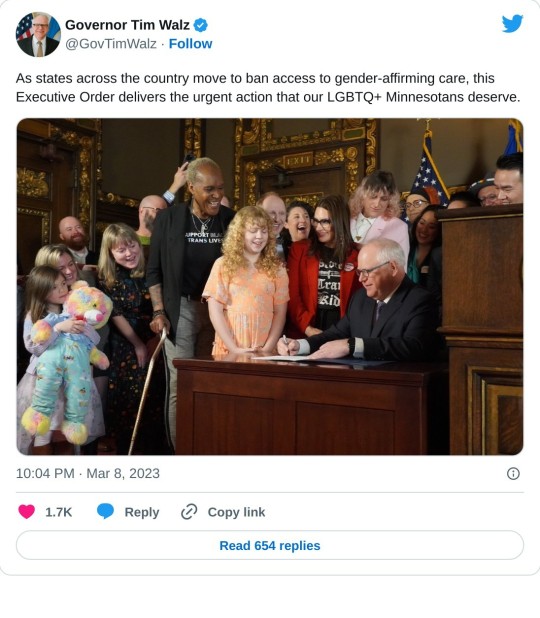
Minnesota Governor Tim Walz signed an executive order protecting and supporting access to gender-affirming health care for LGBTQ people in the state, amidst Republican-backed efforts across the country to limit transgender health care. The order upholds the essential values of One Minnesota where all people, including members of the LGBTQIA+ community, are safe, celebrated, and able to live lives full of dignity and joy.
Numerous medical organizations have said that access to gender-affirming care is essential to the health and wellness of gender diverse people, while states like Tennessee, Arizona, Utah, Arkansas, Alabama, Mississippi, South Dakota, and Florida have passed policies or laws restricting transgender health care.
2. First vaccine for honeybees could save billions

The US government has approved the world's first honeybee vaccine to fight against American foulbrood, a bacterial disease that destroys bee colonies vital for crop pollination.
Developed by biotech company Dalan Animal Health, the vaccine integrates some of the foulbrood bacteria into royal jelly, which is then fed to the queen by the worker bees, resulting in the growing bee larvae developing immunity to foulbrood. The vaccine aims to limit the damage caused by the infectious disease, for which there is currently no cure, and promote the development of vaccines for other diseases affecting bees.
3. Teens rescued after days stranded in California snowstorm: "We were already convinced we were going to die"

The recent snowstorms in California have resulted in dangerous conditions for hikers and residents in mountain communities. Two teenage hikers were rescued by the San Bernardino County sheriff's department after getting lost in the mountains for 10 days.
The boys were well-prepared for the hike but were not prepared for the massive amounts of snow that followed. They were lucky to survive, suffering from hypothermia and having to huddle together for three nights to stay warm.
Yosemite National Park has had to be closed indefinitely due to the excessive snowfall.
4. La Niña, which worsens Atlantic hurricanes and Western droughts, is gone

The La Nina weather phenomenon, which increases Atlantic hurricane activity and worsens western drought, has ended after three years, according to the National Oceanic and Atmospheric Administration. That's usually good news for the United States and other parts of the world, including drought-stricken northeast Africa, scientists said.
The globe is now in what's considered a "neutral" condition.
5. Where there's gender equality, people tend to live longer
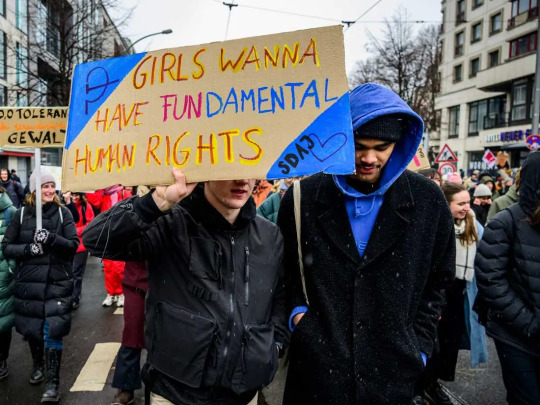
Both women and men are likely to live longer when a country makes strides towards gender equality, according to a new global study that authors believe to be the first of its kind.
The study was published in the journal PLOS Global Public Health this week. It adds to a growing body of research showing that advances in women's rights benefit everyone. "Globally, greater gender equality is associated with longer [life expectancy] for both women and men and a widening of the gender gap in [life expectancy]," they conclude.
6. New data shows 1 in 7 cars sold globally is an EV, and combustion engine car sales have decreased by 25% since 2017

Electric vehicles are the key technology to decarbonise road transport, a sector that accounts for 16% of global emissions. Compared with 2020, sales nearly doubled to 6.6 million (a sales share of nearly 9%), bringing the total number of electric cars on the road to 16.5 million.
Sales were highest in China, where they tripled relative to 2020 to 3.3 million after several years of relative stagnation, and in Europe, where they increased by two-thirds year-on-year to 2.3 million. Together, China and Europe accounted for more than 85% of global electric car sales in 2021
7. Lastly, watch this touching moment as rescued puppy gains trust in her new owners
youtube
By the way, this is my newly started YouTube channel. Subscribe for more wholesome videos :D
---
That's it for this week. If you liked this post you can support this newsletter with a small kofi donation:
Buy me a coffee ❤️
Let's carry the positivity into next week and keep spreading the good news!
749 notes
·
View notes
Text
It's been 10 years since I first watched Frozen!🌻❄️⛏️☃️🦌

(Swedish DVD-copy of Frozen)
November 20th, 2014. It seems like forever ago. I remember watching this movie through my desktop ASUS PC (remember when computers used to have actual DVD-drives?) on a by today's standards pretty crappy Philips monitor. It didn't matter. The movie was like nothing else I had seen before. Even though I don't even have a sibling and can't fully relate to the conflict, Anna and Elsa's adventure is IMO one of the best stories ever told💕
I was 22 back then. A young man and totally in love with this Disney movie. Now I'm 32 and it continues to be among my favourite movies of all time. Even now, ten years later, I still live and breathe Frozen every day! It is a part of who I became and it is the way I wish to remain 😄
I have become a devoted fan of all things Frozen and I'm trying my best to be a part-time Frozen-analyst, mapmaker, worldbuilder and collector. I'm also known for using too many emotes and exclamation marks!
Below, I have tried to summarise some important and meaningful keepsakes and events from the past ten years. I hope you enjoy scrolling!✨✨✨

I believe this was the first ever Frozen-related pic that I saved (it's the oldest in my album) (April 2015)

I was equally in love with the OUAT Frozen arc and no one can tell me Georgina and Elizabeth were anything but perfect for their roles (April 2015)

🥹🥹🥹
(March 2015)

In just a couple of years we saw the franchise grow (did anyone else prefer the original logo for the musical?) (February 2016)

The official announcement we'd all been waiting for (April 2017)

The architect in me loved the castle! (2017)
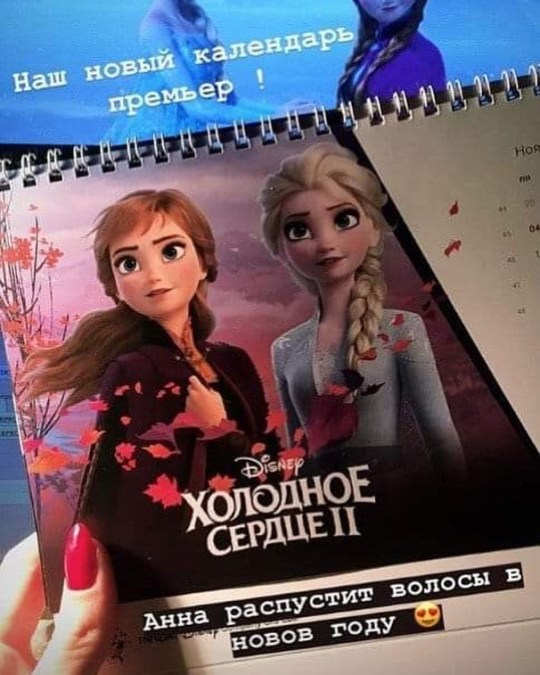
I mean, who could ever forget this moment? (December 2018)

AJHFSJASJFKAGKJFGSKFDSGSJF!?!?!?!?!?!? (February 2019)

What are those????? (February 2019)

My first piece of "big" Frozen merch (April 2019)

I made a custom calendar just to count down the remaining days to Frozen II (I also avoided spoilers for the last 6 1/2 months) (December 2019)

🥹🥰😭
(December 2019)

Perfectly balanced, as it should be (February 2020)

Me collecting stuff! (February 2020)

Me going crazy saving as much Frozen content as possible 😅 (August 2020)

I joined r/Frozen (June 2021)

I started my deep-dive into Arendelle's geography in 2021 which ultimately lead to "An odyssey through Frozen geography", the first of many fandom projects! (July 2021)

Together with a group of equally dedicated Frozen nerds fans, I helped building the @arendelle-archives server and later tumblr-blog! (2021)

Collecting more things! (October 2021)

A Frozen comic writer responded to my reddit post?😲(December 2021)

I started developing ideas for a Frozen fanfic (2022)

Frozen III-announcement! Finally! (February 2023)

My Norway-trip of 2023. Without a doubt one of the most beautiful destinations on Earth and a must-go for anyone who wants to visit the real Arendelle!!! (July 2023)

I continue to delve into more map-related stuff in Wonderdraft (May 2024)

Together with the rest of the wonderful folks over at @frozen10fanzine, I helped create and design a fanzine summarising the memories of Frozen fans from the past decade! (July 2024)

A slice of my current Frozen collection! Some figures were very kindly donated to me by @yumeka-sxf 🙌 (July 2024)
And lastly, from today: the first snow of the season❄️🩵

If you made it this far, thank you for scrolling😅
Finally, a little shout-out to friends and acquaintances I've made through the likes of reddit, discord and tumblr in the past few years:
@bigfrozenfan @yumeka-sxf @greatqueenanna @queenritaofarendelle @saiten-gefroren @snowflaketale12 @cloudberriesforaqueen @theartoffrozen @secretsofthestorymakers
A big thank you also to the whole @arendelle-archives and @frozen10fanzine - teams! Y'all continue to inspire me!

#frozen#frozen 2#disney frozen#elsa#anna#frozen fandom#frozen10#frozen 3#frozen 4#arendelle archives#frozen memories#frozen fanzine#long post
41 notes
·
View notes
Text
Reading Statistic 2024
Archive of Our Own Wrapped is here!
I started the year strong and got in the last 2 month in a reading slump for new works and did a lot of rereading (which I don't count in my spreadsheet). Definitely not as strong as last year, but it is not a competition - not even with myself!
Here are my Wordcounts on ao3 back to 2017 when I started my current system!


Here are the Fandoms I read this year!

Here are the wordcounts for the 5 highest fandoms!

Here are how many works were one-shots or crossovers!


And now we come to my end of year rec list! If you like a specific rec for any fandom you see in my fandom list, ask me! I'm an open book. And love to talk about fanfics.
January
I bookmarked 115 works in january with a total of 1.197.520 words, 82 of those were one-shots, 20 crossovers.
My top 3 fandoms were Formula 1 RPF (37), Batman (31), Criminal Minds (10)
Honorable mention to:
While You Were Missing by basil_coffee_and ( @caffeinatedbasil ) - 85K, 12ch, T, Batman & White Collar A familiar redheaded child darts across the bullpen with a shout of “PAPA!” and barrels into Jason’s arms. “Lian–” He breathes. Jason's undercover work as Neal Caffrey is difficult for several reasons. He didn't anticipate that single parenting would be one of them, though.
February
I bookmarked 115 works in february with a total of 1.312.792 words, 77 of those were one-shots, 28 crossovers.
My top 3 fandoms were Formula 1 RPF (48), Batman (29), Criminal Minds (16)
Honorable mention to
everything to prove, nothing to lose by awaywego (JKDoYouLoveMe) - 28K, 5ch, E, Formula 1 RPF Because tomorrow, Charles will have to go back to pretending. Charles will have to walk back into the paddock and act like he’s an alpha, like he deserves to be there, deserves to be a Formula 1 driver in a world where omegas are seen as little more than an inconvenience. But Charles will prove them wrong. He knew he would right from the start, the first day that he got back into a kart after he’d presented, knowing exactly what he would be up against, that the odds would always and forever be stacked against him just because of his biology. He will win. He will become the first omega World Drivers Champion. He will accept his trophy at the gala and he will take the microphone and he will tell the world that he did that, an omega, an equal. He beat a field full of alphas, but more importantly, he beat a society that has tried to tell him from day one that he would never be good enough.
March
I bookmarked 99 works in march with a total of 1.020.117 words, 69 of those were one-shots, 16 crossovers.
My top 3 fandoms were Formula 1 RPF (50), Batman (28), White Collar (14)
Honorable mention to
En Français and In het Nederlands by loquarocoeur ( @loquarocoeur ) - 14K, 2 Works, E, Formula 1 RPF Max secretly starts learning French and Charles catches him doing a Duolingo lesson and has a bit of a crisis about how Max sounds speaking French. Charles makes it his life's mission to learn Dutch, butchering Max's native language and breaking his eardrums in the process, but then Charles calls him schatje and Max can't handle it even a little bit.
April
I bookmarked 144 works in april with a total of 1.019.779 words, 114 of those were one-shots, 28 crossovers.
My top 3 fandoms were Batman (45), Formula 1 RPF (36), 9-1-1 (31)
Honorable mention to
Unholy Affliction by racingdr1ver ( @racingdr1ver ) - 28K, 2ch, E, Formula 1 RPF “You know… Those posters for missing cats and dogs always include some sort of reward.” “Are you asking me for money?” Charles asks, sounding utterly bewildered. Max cackles loudly, and it comes out a little hysterical. “No, Charles. I meant—” “Ah,” Charles says, and then, without any hesitation, drops to his knees between Max’s legs, hands reaching for his belt. or; a fat tabby cat, a presumptuous bottom, a ski trip, and an endeared max verstappen.
May
I bookmarked 115 works in may with a total of 1.135.608 words, 85 of those were one-shots, 29 crossovers.
My Top 3 Fandoms were Batman (29), White Collar (20), 9-1-1 (18)
Honorable mention to
Smoke by esama ( @esamastation ) - 48K, 13ch,T, Sherlock & Kingsman: The Secret Service For Mycroft, the most jarring thing about V-day isn’t that it happened. It’s that he did not see it coming.
June
I bookmarked 132 works in june with a total of 1.159.057 words, 92 of those were one-shots, 15 crossovers.
My top 3 fandoms were The Sandman (53), Harry Potter (13), Batman (14)
Honorable mention to
drink the poison lightly (ther are deeper and darker things than you) by viiidispade ( @viiidispade ) - 13K, one-shot, T, The Sandman “I warned you, Robert Gadling,” the Stranger hisses. “Against keeping others in bondage.” “And I listened,” Hob gasps. The hand on his throat tightens. “Slavery’s illegal, mate. For centuries.” in which erasmus fry needed to die, the damsel is saved, and hob gadling has no earthy idea how he wound up with a goddess bound to him. (aka, the "hob saves calliope" trope with a twist.)
July
I bookmarked 182 works in july with a total of 1.124.026 words, 153 of those were one-shots, 53 crossovers.
My top 3 fandoms were Batman (66), White Collar (51), Formula 1 RPF (32)
Honorable mention to
such murderous and vengeful desire by foggystars ( @foggieststars ) - 20K, one-shot, E, Formula 1 RPF Where Carlos’ girlfriend has her fingers crossed, keeps covering her eyes as if she can’t bear to watch, Max is focused, mouth set in a hard line. He’s leaning in, balancing on the edge of his seat. To anybody else he looks intent, focused on the screen. To Charles, he looks like a bird, poised to take wing. Like he’s about to fly right through the screen and take the steering wheel from Charles’ clumsy hands, get in there and drive the car himself. When Max Verstappen suffers a career ending injury, he pours all his effort into turning his old rival, Charles Leclerc, into a worthy champion. Five years and two world championships later, they finally decide to talk about it.
&
i'll stare at the sun (and be in love) by starlightrace (starlightvelaris) ( @starlightvelaris )- 17K, 2ch, T, Formula 1 RPF Charles and Max have been karting rivals for as long as they've raced against each other, but a small gesture can lead to unforeseen results, as Max can attest to. Or: a love story in 24 parts.
for more recs of that month check out F1 Wag FicFest ( @f1wagaufest )
August
I bookmarked 102 works in august with a total of 967.297 words, 76 of those were one-shots, 15 crossovers.
My top 3 fandoms were Batman (22), Formula 1 RPF, Harry Potter (14)
Honorable mention to
i'd sing you a morning golden and new by racingline ( @formula-fun ) - 66K, 6ch, E, Formula 1 RPF Max thinks, sometimes, he might have known before Charles did. He thinks it was difficult not to know. Charles has a miscarriage. They don't talk about it.
September
I bookmarked 116 works in september with a total of 1.306.464 words, 83 of those were one-shots, 20 crossovers.
My top 3 fandoms were Formula 1 RPF (43), Batman (27), 9-1-1 (13)
Honorable mention to
Frechheit by additiv ( @additiva ) - 208K, 25ch, E, Formula 1 RPF The first time that Max heard the name Charles Leclerc was in 2022, just after winning his first WDC. Maybe it only stuck because he heard it twice in one night; first as Leclerc was announced as the 2022 F3 champion. Second, as Helmut lamented not signing him to the Red Bull driver development program. Now, Max is ready to put the newly-promoted Ferrari driver in his place. The problem is, Leclerc seems to think his place is on the top step of the podium. And he is not playing by the rules. An age-difference fic, where they never got to work out their differences as kids. 3-time WDC Max's experience of being personally victimised by baby-Charles.
&
Archive of Our Own by Lady_Something ( @ladysomething ) - 21K, one-shot, E, Formula 1 RPF “Do you know what fanfiction is?” Max blinks. “Yeah?” “Oh, good,” Charles says, even more relieved. “Do you know people write about celebrities?” Max rolls his eyes. “I’ve been briefed by PR, yeah.” Charles flops down on the lounge, Sassy and Jimmy long gone, and props his feet up on the coffee table. Max rolls his eyes again, then sits down next to him. He and Charles are friends, kind of, and certainly closer now that they’ve ever been before, but he’s never really witnessed Charles having a PR-related meltdown before. They’re not that close. Oh, well. A first time for everything, he supposes. “Great!” Charles says cheerily, then unlocks his phone and shoves it in Max’s face. “Do you also know that we’re ranked second on Archive of Our Own?” // Charles discovers fanfiction. He makes it Max's problem
for more recs of that month check out saya4haji because I also read a lot of her work of Daisy from agents of shield in different fandoms in that month.
October
I bookmarked 99 works in october with a total of 1.32.146 words, 76 of those were one-shots, 23 crossovers.
My top 3 fandoms were Formula 1 RPF (47), Batman (18). White Collar (14)
Honorable mention to
You're On Your Own Kid by TiredAndHungry7 - 21K, 2ch, T, Formula 1 RPF "Bad luck on the last right hander there Max. Better for us both next week you think?" And then. Well. Then there was him. If anyone could make him stay, in this godforsaken world of open wheel racing it was the boy with the kind eyes and messy hair. "Oh? Yes? Bad luck?" Max didn’t bother attempting to disguise the contempt in his voice. Charles paused. Looked back. He saw too much for someone so young. Most people just saw Max's rage and looked away because watching such strong emotions was uncomfortable. "Lorenzo is not here, but he decided this after my parents picked food. Dinner?" The bastard had just gotten them both disqualified, bold face lied to a fucking reporter, and now he was asking if Max wanted to avoid his dad for another couple of hours and eat food that wasn’t from a takeout bag? “Fuck yes.”
November
I bookmarked 115 works in november with a total of 744.180 words, 83 of those were one-shots, 22 crossovers.
My top 3 fandoms were Formula 1 RPF (42), Batman (28), White Collar (13)
Honorable mention to
Two Sidekicks Walk into a Villain Bar by Triscribe ( @triscribe ) - 13K, T, Flash, 3 Parts in a series “I want something strong,” the speedster practically snarled, hand slamming down onto the countertop with cash. A few guys shifted like they wanted to scoot out the still open door, only to freeze when the older Flash stepped through it. “Kid-” “This is what we do, right?” The Kid spun around, fists clenched, glaring at his uncle. “Since you’re all ready to stop looking, that means it’s time to give up and come get drunk, right?” “We aren’t stopping-” “Bullshit!”
December
I bookmarked 89 works in december with a total of 554.054 words, 79 of those were one-shots, 10 crossovers.
My top 3 fandoms were Formula 1 RPF (36), Batman (17), White Collar (13)
Honorable mention to
This Is What I Get by nitaekook ( @nitaekook ) - 13K, M, Formula 1 RPF The thing about drowning, Oscar thought, was that it didn’t feel like drowning. Not at first. At first, it was just the sensation of being pulled under. Just a little. Not enough to panic. Not enough to thrash and scream. You told yourself you could hold your breath, that you’d float back to the surface eventually. But then came the pressure, that creeping weight pressing down on your chest, subtle and unrelenting. That was what no one told you: drowning wasn’t the struggle to breathe. It was the waiting. And waiting was all Oscar ever seemed to do these days.
#ao3 wrapped#mostly f1 so it gets a tag#f1#fic#fanfic#ao3#the 5k i maybe would still read this year just fell under the table#i have no clue what happened in december#suddenly i didn't want to read anything#glad to have this finally out of my drafts#everytime i edited it I feared i would click delete#seconds before posting i remeber i wanted to add the physical books i read#nah it gets its own post this one is long enough
27 notes
·
View notes
Text
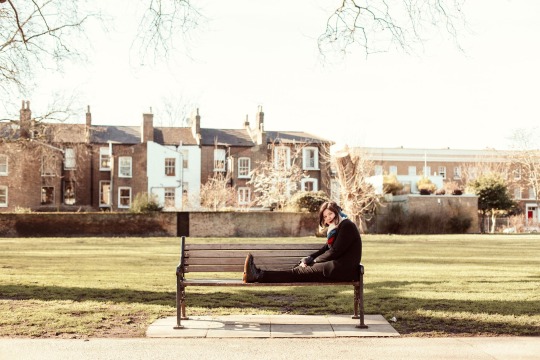
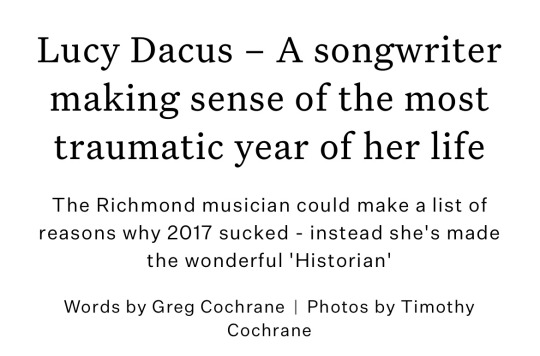
On New Year’s Eve, during a house party at her home in Richmond, Virginia, Lucy Dacus had her fortune told. She thought why not. On a personal level, 2017 had been a wretched year – a steady conveyor belt delivering the 22-year-old bad news.
“This girl, who I didn’t even know, came to the party and gave me this year-long reading,” she explains. “Month-by-month it was so specific. So far, it’s kind of lined up.”
In the past Dacus has been sceptical about the prophetic powers of the tarot card deck, and was taught that the pentacles (coins) were a symbol of Satan. “It’s hard to look to the future and see nothing, to know nothing,” she muses. “I still don’t know what’s going to happen, but having something to have your mind bounce off is nice. That’s why I like tarot. It gives you something to reflect on.”
It’s all part of a fresh way of thinking for Dacus, a new “mood of just trying to be open to new things.” For so many reasons the past year has been one Lucy Dacus is keen to put behind her. “I guess I could just list things,” she says laughing, but not joking. To begin, some of her close family suffered health problems, compounded by her own serious issues including a bout of appendicitis that forced her to have surgery. She was attempting to buy a house for the first time, a process that proved “trying”. Three of her tours got cancelled.
“It was a little bit miserable,” says Dacus, sitting in an east London cafe. “Towards the end of the year, I just had to laugh… Like, come on!”
Interwoven with these practical challenges she was having to navigate something much more troubling. “I got out of a relationship in 2016, which I was waking up from in 2017 – realising that it was abusive,” she begins. “Letting myself say that, it took many months to come out of the numbness… to stop being brainwashed. So, that’s all been a growth. It’s ended up being positive, but it is difficult wondering how I let that be a part of my life for so long.”
Deepening the ordeal, still, this year of personal upheaval was set to the backdrop of Trump’s first 12 months in office. A vociferous supporter of Bernie Sanders through the 2016 election campaign, Dacus is a passionate advocate for equal rights, attending marches and collecting donations for community organisations at her shows. To have Trump sat in the White House representing her country, she says, felt – feels – “horrible”. “It’s just absurd and I feel like I’m in an alternate universe,” she says. “It’s really hard maintaining hope.
“Coming to Europe I’m embarrassed to be an American sometimes, but then I just have to hope that people know that I am not part of Trump. I’ve thought about wearing shirts at the airport – just like ‘not my president’. In little ways I just want to assert that opinion.”
And then there were the disturbing revelations surrounding Harvey Weinstein (and subsequently many other men) revealed in Autumn 2017, that opened out into a global conversation around the abuse and harassment of women.
“It’s been nice coming out of that really terrible relationship during a time when women are speaking up more. It feels like I’m allowed to say these things now,” says Dacus, crediting the #MeToo movement. “All these horrible, heartbreaking stories of women being mistreated are at the forefront but the solace that people are doing what they need in order to find closure and help each other prevent that happening ever again. For one of the first times I’ve been noticing male friends of mine actually examining their past behaviours.”
While there are some early shoots of positivity, the truth is, the culmination of all of these factors left the songwriter dealing with anxiety for the first time. “2017 was a new state of mind for me – and not really in the best way.”


Lucy Dacus was raised in Richmond, Virginia, about two hours south of Washington D.C. on the east coast. It’s a place sometimes described as “the biggest small town left in America.” The family home was in the rural suburbs and she travelled into the city to go to high school. “It’s hard to tell you in one answer how my whole childhood was,” she says. “It’s a large variety of things. Overall, I’m coming out with my thumbs up.”
In her household music was always there. Her mother is a piano teacher, as was her grandmother. Picking up songwriting was never a big deal, like a second language that was spoken around the house. “That’s how music is – like, it’s just part of my life,” she recalls.
Yet the dream of being a professional artist seemed almost so unattainable that it was invisible. In her late teens, Dacus went to college to study film but dropped out, primarily because she’d end up saddled with huge debt. “That, paired with the feeling of being misunderstood in my programme,” she confirms. “I just didn’t have a lot of like minds in my classes.”
That prompted a move back to Virginia where she took a job in a photography lab developing kids’ cheesy school photos. She’d been writing songs in her spare time and gathered nine of the 30-or-so she had together when her friend Jacob Blizard (now her touring guitarist) asked her to record them for his school project. Her 2016 debut album, ‘No Burden’, was made in one day in Nashville. Blizard passed school, and that album received rave reviews. NPR called it “vulnerable”, while Pitchfork said it was an “uncommonly warm indie rock record”. As a result, 20 different record labels reportedly scrabbled to sign Dacus. She settled on Matador, and began to prepare for what should have been a joyful 2017.
The first time Dacus remembers assuming the role of historian she was seven or eight-years-old. She was writing in her journal – and she smiles now recalling her first entry. It complained about how the babysitter spent the whole evening on the phone to her boyfriend. “There’s a point where I realise I’m journaling and so I stop and go, ‘I should probably introduce myself… I’m Lucy’” she laughs, remembering it clearly. “It’s really cute.”
More than a dozen notebooks, and many years later, she still keeps a diary now. Sometimes she writes every day, other times, weeks go by and then she fills 20 pages. Occasionally she flicks open an old one to either “laugh or cringe” at her younger self.
‘Historian’, then, isn’t just the title of her latest album, but also the way she thinks of herself. A chronicler, of her own experiences, but also those around her. Those pages aren’t just a document of a growing maturity, but also a therapeutic habit that helps make sense of many life events, including that recent damaging relationship. “Seeing that it had been broken for the whole time but that I was just oblivious to it, [reading about] it helps to accept that things didn’t change,” she says. “I just saw it for what it was finally, and so perspective is good.”
Those handwritten journals are sacred, which is why, when her tenth one was stolen on tour a few years ago along with a bag of possessions, it was the notebook she replaced first.
The album itself is a recent history – a narrative burrowing through those myriad dark times. Dacus knew that she wanted it to form a complete story, and wrote the track list before some of the songs. “It’s an arc” she says, that begins in a “relatable place” with the only break-up song she’s ever written (‘Night Shift’) that subsequently delves “deeper into darkness.”
“Then the subject matter gets a little more intense,” she tells me, “– going through identity crises, or loss of home, or loss of faith, loss of a loved one, loss of your life. I feel like I’m pulling people into an uncomfortable space.” She pauses. “There’s then a change where hopefully I’m turning on a light and saying, ‘Yes, all of that exists, but it’s a foil to joy.’”

It is an extraordinary piece of work. Musically it’s a colossal step up, reminiscent of recent albums by Mitski (‘Puberty 2’), Angel Olsen (‘My Woman’) and labelmate Julien Baker (‘Turn out the Lights’). The subject matter is heavy, but it’s never a dreary listen. In fact, it’s charming, funny even – like a brave smile emerging through a curtain of tears. And Dacus has a gift for lyric writing; like the eloquent way she pays tribute to the humility shown by her dying grandmother on ‘Pillar of Truth’. From first to final note it’s evocative and powerful. “The first time I tasted somebody else’s spit I had a coughing fit,” goes the LP’s opening line in ‘Night Shift’. “If past you were to meet future me,” she sings on the final line of the closing title track, “would you be holding me now?”
It’s heartening to hear that the contents of Dacus’ NYE tarot reading were largely positive. The forecast noted that she should enjoy the proceeds of her hard work, but that “something horrible happens in the summer, then there’s kind of a rebirth, growing back into, like, life in an even more knowledgeable and peace-oriented way.” Dacus is about to leave, and picks up a bag of books she’s been keeping underneath the cafe table.
“It could be wrong,” she says. “I’m not superstitious. I’m taking it in. When that does happen I hope I can take my own advice – let it be what it is, and look past it eventually
(x) 3/14/18
49 notes
·
View notes
Text
The largest protest in American history is said to be Black Lives Matter, with up to 26 million participants over the course of the protests. The largest single day protest is said to be the 2017 Women's March, with between 3+ and 5+ million in one day.
Tel Aviv, Israel-one single city-mustered 500,000. Half a million protesters, in a country with less than 1/30th America's population. As a percentage of population, that's equal to about 17 million Americans. One one day. In one city.
Then the whole country followed it up with a general strike the next day, with the backing of the leader of the political opposition.
And yet, fringe Western Leftist activists have the fucking presumption to condemn all Israelis, while entertaining fantasies of a Leftist revolution in the US. When it is Israelis (along with Ukrainians when they kicked Yanukovych out, and have resisted fucking Russia ever since) who have set the world gold standard in recent years for resisting corrupt, incompetent, authoritarian regimes.
As a citizen of the US and Canada, I fucking wish I could believe that either of my own countries' people would do one half as much, should a MAGA government take power here.
Maybe that's part of why the radical Left hates Israel/Jews (and Ukraine) so much- you're jealous that they're much better at this than you.
#Israel#Gaza#Palestine#Tel Aviv#Protests#General Strike#Israeli General Strike#Fuck Netanyahu#Lock Him Up#Ceasefire Now#Ceasefire For Hostages#Bring Them Home Now#Ukraine#Slava Ukrainii#US#Canada#MAGA
26 notes
·
View notes
Text
US State Restrictions and Excess COVID-19 Pandemic Deaths - Published July 26, 2024
Key Points Question How did state restrictions affect the number of excess COVID-19 pandemic deaths?
Findings This cross-sectional analysis including all 50 US states plus the District of Columbia found that if all states had imposed COVID-19 restrictions similar to those used in the 10 most (least) restrictive states, excess deaths would have been an estimated 10% to 21% lower (13%-17% higher) than the 1.18 million that actually occurred during the 2-year period analyzed. Behavior changes were associated with 49% to 79% of this overall difference.
Meaning These findings indicate that collectively, stringent COVID-19 restrictions were associated with substantial decreases in excess deaths during the pandemic.
Abstract Importance Despite considerable prior research, it remains unclear whether and by how much state COVID-19−related restrictions affected the number of pandemic deaths in the US.
Objective To determine how state restrictions were associated with excess COVID-19 deaths over a 2-year analysis period.
Design, Setting, and Participants This was a cross-sectional study using state-level mortality and population data from the US Centers for Disease Control and Prevention for 2020 to 2022 compared with baseline data for 2017 to 2019. Data included the total US population, with separate estimates for younger than 45 years, 45 to 64 years, 65 to 84 years, and 85 years or older used to construct age-standardized measures. Age-standardized excess mortality rates and ratios for July 2020 to June 2022 were calculated and compared with prepandemic baseline rates. Excess death rates and ratios were then regressed on single or multiple restrictions, while controlling for excess death rates or ratios, from March 2020 to June 2020. Estimated values of the dependent variables were calculated for packages of weak vs strong state restrictions. Behavioral changes were investigated as a potential mechanism for the overall effects. Data analyses were performed from October 1, 2023, to June 13, 2024.
Exposures Age and cause of death.
Main Outcomes Excess deaths, age-standardized excess death rates per 100 000, and excess death ratios.
Results Mask requirements and vaccine mandates were negatively associated with excess deaths, prohibitions on vaccine or mask mandates were positively associated with death rates, and activity limitations were mostly not associated with death rates. If all states had imposed restrictions similar to those used in the 10 most restrictive states, excess deaths would have been an estimated 10% to 21% lower than the 1.18 million that actually occurred during the 2-year analysis period; conversely, the estimates suggest counterfactual increases of 13% to 17% if all states had restrictions similar to those in the 10 least-restrictive states. The estimated strong vs weak state restriction difference was 271 000 to 447 000 deaths, with behavior changes associated with 49% to 79% of the overall disparity.
Conclusions and Relevance This cross-sectional study indicates that stringent COVID-19 restrictions, as a group, were associated with substantial decreases in pandemic mortality, with behavior changes plausibly serving as an important explanatory mechanism. These findings do not support the views that COVID-19 restrictions were ineffective. However, not all restrictions were equally effective; some, such as school closings, likely provided minimal benefit while imposing substantial cost.
Proven by statistics: Masks save lives. Distance work saves lives. Remote options save lives.
#covid#mask up#pandemic#covid 19#coronavirus#wear a mask#sars cov 2#still coviding#public health#wear a respirator
36 notes
·
View notes
Text
“Although nearly all individuals who identify as trans would simply like to use the facilities and get on with their day, granting males access to female spaces opens a door for sexual predators to potentially abuse women and children. Well over one hundred such cases have already been reported.(23) Many parents and women ask, "If a person who is male but identifies as female is unsafe in a male restroom, what makes the females safe when a male enters their space? Why is it necessary to make women feel unsafe to make men feel safe?"
For example, consider the difficulties faced by women's shelters. Many of these exist to provide a haven for women who are escaping domestic abuse. One sex abuse victim who suffered from post-traumatic stress disorder filed a human rights complaint in Toronto after being forced to share a room with a man who identified as a woman.(24) In California, nine women from a homeless shelter filed a sexual harassment lawsuit because they were forced to share a shower with such an individual.(25) Because the Department of Housing and Urban Development has redefined sex to include gender identity, such shelters cannot discriminate against men who seek admission to such shelters if they identify as female.(26) Should battered women be forced to choose between homelessness and sharing a room with a man? On the other hand, should homeless or abused men who present as female be forced to use shelters and showers for men?
The debate isn't likely to subside any time soon, and perhaps the best solution is to provide additional services and unisex or private restrooms to anyone who might wish to use them. That way, the privacy and safety of women and children are respected, while individuals who identify as trans are not forced to enter spaces that make them feel unsafe and uncomfortable. After all, making reasonable accommodations in a spirit of Christian charity does not require one to endorse all of gender theory.”
-Jason Evert, Male, Female, or Other: A Catholic Guide to Understanding Gender
—
Work cited:
23) Cf. Ryan T. Anderson and Melody Wood, "Gender Identity Policies in Schools: What Congress, the Courts, and the Trump Administration Should Do," Heritage Foundation Backgrounder 3201 (March 23, 2017).
24) Cf. "Forced to Share a Room with Transgender Woman in Toronto Shelter, Sex Abuse Victim Files Human Rights Complaint," National Post, August 2, 2018.
25) Cf. "Shelter Forced Women to Shower with Person Who Identified as a Transgender Woman and Sexually Harassed Them, Lawsuit Says," ABC30 Action News, May 24, 2018.
26) Cf. U.S. Department of Housing and Urban Development, "HUD Issues Final Rule to Ensure Equal Access to Housing and Services Regardless of Gender Identity," press release, September 20, 2016.
—
For more recommended resources on gender dysphoria, click here.
#mtf#ftm#genderfluid#nonbinary#transgenderism#transgender ideology#Jason Evert#quotes#Male Female Other: A Catholic Guide to Understanding Gender
10 notes
·
View notes
Text
Aja Romero at Vox:
With mere days left on the 2024 political campaign trail, you might have noticed the Trump camp has increasingly turned to scapegoating familiar targets, including immigrants, the press, and women. It has also increasingly doubled down on attacks on trans people.
A recent report by ABC News revealed that nearly a third of recent campaign funds — or $21 million, per ABC’s report — for television advertising has been spent on transphobic messaging from the Trump campaign and various conservative political groups. The independent journalist collective the Bulwark pushed the total even higher, to $40 million poured into transphobic advertising within the last five weeks. The ads, paid for by the Trump campaign, use a litany of transphobic coding, including photoshopping Kamala Harris to appear as though she’s posing beside a nonbinary person in a mustache and a dress, despite plenty of evidence that this strategy is a turn-off for voters. “Kamala even supports letting biological men compete against our girls in their sports,” one ad declares. All three ads attack Harris for supporting gender-affirmative care for trans prisoners, including surgery where medically necessary. “Kamala is for they/them,” each ad concludes. “President Trump is for you.”
Given that trans people make up barely half of 1 percent of the US adult population and that trans-related issues are low on the priority list of most voters, many might find it baffling that Trump has focused so much of his attention on singling out trans people. Indeed, two different media research groups, the left-leaning Data for Progress and video marketing firm Ground Media, working in partnership with GLAAD, each released studies last week finding that the ads had no real impact on voter decision-making and instead alienated many viewers, even among Republicans, who felt they were “mean-spirited.” So then why do them? Well, there’s “winning” in terms of appealing to voters, and then there’s “winning” in terms of determining the conversation. Keeping the focus on trans people — Harris’s actual policy proposals do almost nothing to advance the status of trans citizens — fires up a certain base and crowds out other discussion.
[...]
In other words, these ads help to reinforce the idea of a common enemy. They are continuing — which is to say winning, in a very real sense — the larger ongoing culture war against queer and trans people. The willingness of Trump and his supporters to invest in these ads arguably indicates that even if Harris wins the election, marginalized communities in red states will still be under threat from Trump supporters and from growing legal restrictions on those regions. But trans people aren’t isolated targets. They are scapegoats in the historical sense — canaries in the coal mine for the growing march of fascism in the US. That puts all of us in danger. Trump centering transphobia in his campaign strategy is not new. It’s the culmination of a decade-long conservative political strategy of weaponizing anti-trans messaging to undermine and reverse what was a broad cultural shift toward LGBTQ equality.
[...]
As the Supreme Court’s 2015 decision to legalize same-sex marriage took effect, conservative groups turned away from targeting queer people to instead target trans people in a “divide and conquer” strategy, as a conservative organizer named Meg Kilgannon summarized in a 2017 Family Research Council panel: “For all of its recent success, the LGBT alliance is actually fragile,” she told the assembly. “If you separate the T from the alphabet soup, we’ll have more success.”
To do this, conservatives joined forces with unlikely allies, including “trans-exclusionary radical feminists,” to drum up antagonistic sentiments against trans people. Right-wingers spread alarmism, rolling out dozens of anti-trans bathroom laws across the nation, then using them to introduce other transphobic ideas into local conservative platforms, all of them coming straight out of the moral panic playbook. These tactics didn’t directly address the sociocultural progress that trans people were making; instead, they cultivated a new wave of unfounded fear and alarmism about trans people themselves.
And the propaganda has only gotten more effective over time. Where transphobic bathroom bills mostly failed a decade ago, they’re now coming back into fashion; last week, Odessa, Texas, passed a bathroom bill that offers a $10,000 bounty paid to anyone who spies a trans person using the “wrong” bathroom.
The core elements we see used to attack and oppress trans people in the US in 2024 aren’t really about trans people; we’ve seen these same fearmongering tropes weaponized against numerous marginalized groups throughout history. They serve a greater political purpose — not just to demonize one specific group of people but to reinforce an in-group mentality that can then be deployed against all enemies. These attacks are a political cudgel.
Donald Trump’s anti-Kamala Harris ads bashing trans people are all about demonizing trans people.
#Donald Trump#Kamala Harris#2024 Election Ads#2024 Presiential Election#2024 Elections#Transgender#Transphobia#Anti Trans Extremism#Gender Affirming Healthcare#Restroom Ban Laws#Bathroom Bills#LGBTQ+
11 notes
·
View notes
Photo




(via Monday Motivation: Hear My Story, Vote XX)
#Election 2024#Monday Motivation#Monday Mood#Monday Morning#Women#Feminism#Feminist#Tracy Chamberlain Higginbotham#Tracy HIgginbotham#Women's March on DC#Women's March 2017#MeToo#survivor#Vote for Women's Rights#Vote for Women#equality#female#vote female#XX
0 notes
Text
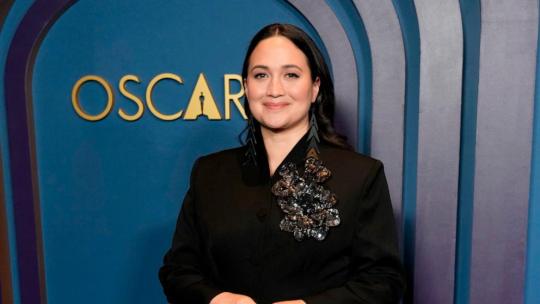
Why hoping Lily Gladstone won an Oscar does not equal valuing race over talent.
Social media is never a great place to have discussions about race and culture. The real issues at hand are way too nuanced and detailed for outrage factories like X/Twitter and Instagram to handle.
Still, I was disappointed to see so many people – perhaps willfully – missing the point online when discussion rose after the Oscars about Lily Gladstone failing to win best actress honors.
No doubt, a win for Gladstone – who would have been the first Native American woman to earn a major acting Oscar – also would have felt like a serious triumph for champions touting the power of diversity in film.
Feeling the love big time today, especially from Indian Country. Kittō”kuniikaakomimmō”po’waw - seriously, I love you all ❤️ (Better believe when I was leaving the Dolby Theater and walked passed the big Oscar statue I gave that golden booty a little Coup tap - Count: one 😉)
— Lily Gladstone (@lily_gladstone) March 12, 2024
Those of us who clock these things regularly knew that Emma Stone’s turn in Poor Things was most likely to spoil that scenario. Stone offered a showy-yet-accomplished performance as a singular character in an ambitious, creatively weird production. A much-loved past winner delivering a career-best effort, she was just the kind of nominee that Oscar loves to reward. And, as Vulture pointed out, modern Oscar voters seem to enjoy turning against expectations in big moments like this.
But when I expressed those feelings online – that Stone was marvelous and more than earned the award, but the Oscar academy really missed a chance to make history by overlooking Gladstone’s more subtle, quietly powerful turn in a better movie – the knives came out.
The gist of most negative reactions was the implication that I and others lamenting her loss were insisting that ethnicity should trump talent. As if the only or most important reason that an indigenous woman could be nominated for such a lofty award, is by people trying to bring social justice to the Oscars. (I guess Gladstone’s wins as best actress at the Golden Globes and Screen Actors Guild awards, among others, were also nods to diversity?)
As if it couldn’t be possible that perhaps -- just perhaps -- some racial cultural preferences were mixed up in Oscar voters’ attraction to the story of a beautiful, young white woman who has loads of sex while learning to define herself in a male dominated world.
What really disappointed me, however, was reading an analysis which reached all the way back to the 2017 Oscars to imply that one reason Barry Jenkins’ masterpiece Moonlight won best picture honors over La La Land was the pressure to bring social justice to the Oscars.
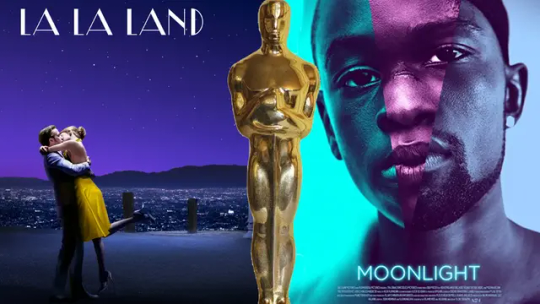
Talk about missing the point by a mile. What I’m driving at, when I advocate for contenders like Gladstone, Barry Jenkins and Jeffrey Wright, isn’t a finger on the scale to make up for past exclusion.
It’s a plea for Oscar voters to see these performances the way I and so many other people actually see them.
I still remember watching last year’s version of The Color Purple in a screening alongside lots of folks from Black fraternity and sorority organizations. And when the moment arrived where Danielle Brooks’ character intoned about her husband, “I loves Harpo — God knows I do — but I’ll kill him dead before I let him or anybody beat me,” it felt like the whole theater said those words with her. That’s how iconic those lines -- first spoken on film by Oprah Winfrey in the 1985 production – have become for Black America.
youtube
That same feeling came after I first saw Cord Jefferson’s brilliant American Fiction, centered on a frustrated, floundering Black writer who creates a stereotypical parody of a Black novel as a dark joke, only to see it become a best seller. I felt as if Jefferson had pulled the same bait-and-switch with his movie that his lead character managed onscreen – using the outrageous premise to draw us all into a more subtle and deliberately powerful story of a Black man struggling to connect with his family after huge losses.
I needed three attempts to get through watching all of Gladstone’s work in Killers of the Flower Moon. Not because the movie was so long I had to “get my mail forwarded to the theater,” like Oscars host Jimmy Kimmel joked. But because it was so hard for me to watch a film centered on the historic exploitation and murder of Native American people by white men.
It sounds like a simple idea, but it’s worth repeating: evocative moments in films will speak differently to different people.
Sometimes, when I’m pushing for a win in an awards category, or championing a particular project, it’s not because I’m putting a finger on the scale for the sake of equality. It’s because I’m more invested in that story than some others because of who I am. And I’m challenging some people, who might not see their cultural preferences as preferences, to consider exactly why they love one thing over another.
In many ways, it is sad to see great artists pitted against each other in these contests. Comparing the delightful, dangerous absurdity of Poor Things to the gritty, punishing tone in Killers of the Flower Moon feels like a fool’s errand, anyway.
But with so much that comes from an Oscar win – including proof that inclusion brings success, accolades and a great argument for more equity – it is important to understand why some people value some performances.
And part of living in a diverse society means valuing the wide range of opinions and reactions, not shrugging off those that don’t fit your worldview.
29 notes
·
View notes
Note
can i ask, what’s wrong with dcc? i always hear that they kinda suck as a company, but from the vlogs i’ve seen, they’re one of the better companies. i’m not really as into dreamcatcher as some of the blogs on here even though i consider myself a stan, so i might not have the right information
okay. I feel like this is like opening my personal pandora box so this might be long. I'm pretty tired today so apologies in advance if this isn't very coherent asdkjh
dcc are a pretty decent company on a surface level, they treat the members well (which should be like the bare minimum for any company but I know that in this industry that's something to genuinely praise) and they actually change according/respond to negative feedback from the fandom etc when they or the members mess up (or they used to anyway).
for me it started in 2020 and how they handled handong's return. like the way they handled her absence was fine (good even, I would say), but the lack of hype for her actual return made things feel so underwhelming even though it was supposed to feel like a relief that she was finally back. I can't remember all the details anymore, but I do remember that the first time I felt like things were actually alright with dc was when they did the online concert crossroads in march of 2021. on that note I think most ppl were expecting ttol and dlm to be repackaged with ot7 versions and yet it's 2024 and they still haven't released them.
the handong stuff atp is water under the bridge tho, the group is fine, the members are fine, etc, I'm only mentioning it because that's when things started to feel really off for me.
so now we get into the actual things that happened that have left the fandom feeling burned out/frustrated/disconnected etc etc, whereas this happened to me at the end of 2022, I'm seeing more people now going through what I did back then:
I think the most pressing thing was that dcc didn't capitalize at all on dc's first win. they got their first win in april 2022 and didn't even do anything special in korea to commemorate it. it was a HUGE moment and they did nothing with it. usually after a group gets a first win you'll see them getting more promotions in korea, magazine photoshoots, mc deals, etc but dc just went on ahead to do festivals in europe and have a usa tour, these things are not bad but it was the lack of promotion in korea that in turn just made it all feel useless. that year dc also weren't invited to any end of year awards if I'm not mistaken so it all felt really disappointing and like all of the work we had as a fandom had been for nothing. I have to reiterate, dc/insomnias had been getting screwed over on music shows since 2019 with deja vu to get that first win, like I don't want to talk about the injustices the group and this fandom suffered through the years but it was a true story of resilience, so getting that first win in 2022 was a huge relief. to see it all going to waste was just... heartbreaking honestly.
when it comes to tours...... god I don't wanna get too much into it, but 4 tours in the usa in the span of 2 years is not normal. specially when they're prioritizing that over having a proper asia tour and the likes (AND promoting in korea??). latam tour is practically sold out rn and they're getting no merch or m&g benefits like the usa tour. I don't think doing exclusive things for a specific tour is bad per say, but you have to treat all your fans semi equally at least, specially for a group whose fanbase is majorly international (this will be important later), or it will happen what is happening rn which is ppl will leave the fandom. This is the first latam tour since 2019 (2017 for brazil!)... they've waited a really long time so personally (even tho this doesn't affect me bc I'm european) I feel like it's really disrespectful but wtv, onto other things.
now, speaking of the fanbase being majorly international, if this is the case, you'd think the company would make an effort to stream important events to their fans, like hmm the 7th anniversary concert perhaps? but nop, that didn't get streamed. a repetition of the dumbassery they did in 2022 where they split the concert and the members' solos in 2 days and only streamed one and so intl fans couldn't watch half the solo stages? and don't get me wrong, I think it's important that they have events that are korea only like they have the fansigns etc, but something as major as their 7th anniversary? when they've gotten here thanks to their international fans? that stings a little.
and lastly (maybe), we have dcc's usual lack of promotion during comebacks. fans always paying for ads, intl fans always doing the most for digitals even when it's Not their place (because this is smth that the korean fandom and dcc should be responsible for), fans having to reach out for vendors etc... Justice cb truly has been the culmination of the very worst promotions dcc has done tho and there have been some really bad promotions before... no radio shows, minimum interviews, barely any variety... were there even any ads? usually it's always fans paying out of pocket for ads. it just feels like throwing the members' and the company's work out the window for no good reason? Virtuous is one of their best albums and yet it feels like they just dumped it to go on tour again. I don't think that's necessarily a bad thing btw, having short promotions in korea is fine but like... promote for real? give your fandom content that they can watch and rewatch for however long it takes your group to have another cb? specially now that it seems that they're shifting to one album per year (not sure this is their wisest decision tho all things considered), you have to make sure that you promote that album properly? which kinda also goes with like, giving your fandom enough time to save for what you release and put out, specially if you're not trying to grow the fandom anymore. if they're dropping an album then don't announce a tour on top of that, and if they're announcing a tour then don't announce a photobook on top of that, and if they've just released an album then wait longer than a month to announce a photobook, and if they've just dropped a photobook then wait a bit longer until announcing the re print of albums the fans have been begging you for 6 years to re print LOL bc all this does is frustrate fans who can't make that much money in such a short time and it's stupid. like. in 2018 I dropped like 200 euros for like their very first photobook BECAUSE I had time to save that amount from their you and I cb (may) to whenever it was announced (I think it was august), and that was the highest tier (so you could get it for much cheaper) and bc back then it was like. well they barely release anything other than albums, so it's fine (also shipping was sooooooo much cheaper I miss it everyday, ofc this is not their fault tho but anyways).
lastly actually, oh my god. that stupid ass app where fans pay a subscription to message the members privately? has been the fucking worst thing to happen to this fandom and the members imo. if fans weren't respecting their boundaries before, it's even worse now. but it's also like. yeah the members should be reinforcing those boundaries, and I get wanting to at least make a buck of those problematic type of fans but I just don't think it has been good for the members at all. I won't elaborate too much on this because it will genuinely piss me the hell off but bottom line: that app has been hell for everyone genuinely there is no bright side to it other than dcc makes money out of it. and there's better ways to make money :))))))))
anyway this is over 1k words atp and somehow I feel like this all just the tip of the iceberg and I probably have forgotten many things bc tbh in the past year I've just. been trying to make peace with it all and just accept things for what they are because dc have been really special to me for such a long time and I just don't want dcc's decisions to make me throw all of that away (like I almost did). I love their music, I love the members, and so I will continue to celebrate wtv right decisions dcc makes but I'm not going to pretend that they're a good company when it comes to business decisions bc they're really not
12 notes
·
View notes
Text
The Wandering Jew (Alfie Solomons x fem!OC)
"Welcome to end of the World", Alfie said.

Alfie x Rose Masterlist
Summary: It was like an apocalyptic movie. First it wasn't that bad, or that was people thought, until it was that bad. Rose landed in London with the idea of returning home a week and a half later, but few days after that, the PM decided to close everything. His flight was cancelled and getting a new one was an impossible mission. The world is facing a new era and she's there trapped in an Inn, in a distant city with a complete stranger and his dog.
Warnings: Just topics related to covid-19.
Words: 2K. || I'm rewriting the first chapters I posted last year. I changed several things and I'm happier now. You can find the rest of their modern story here.
Series masterlist.

18th March 2020.
The world was starting to panic because of the new virus created in China. Or maybe it was a sick bat that, like a domino effect, caused thousands of deaths already. China was closed, countries around it, too. Italy was collapsing slowly and the WHO already declared that this new virus, called COVID-19, was a pandemic.
Yet, millions of people continued with their lives as always. Working, going to classes, visiting friends or relatives and others, like Rose, were travelling.
Born in London in 1988, Rose Coldwell was returning to her city after eight years living in New York where she moved with her mother and two brothers. She received an important job offer back then and the money was beneficial for the four of them. Louis, her youngest brother went to high school and Samuel, the second brother, begun to study law in a good college there. Now the youngest was studying architecture and Samuel was part of a law firm in Manhattan.
Rose, on the other hand, ran her own fashion blog and had a small business. Nothing too extraordinary, but something that made her happy. After several years of sending mails and filling out forms to be part of any international fashion event and equal numbers of rejections, she sent a mail to be part of an international convention there in London and she was accepted. 2020, it was going to be an unforgettable year, she thought.
And she was right… but the reasons were going to be quite different.
The plane landed and she felt she was returning home like the prodigal son, or daughter. Not even once since she left the country she returned there and it was a pleasant feeling to be back on her land.
Some people around her in the airport were walking fast avoiding the multitude. Some were wearing masks, some not. A woman wearing one was offering alcohol to sanitize people's hands. An old man sneezed and caused several disgusted faces from people around him.
'Probably he's just allergic,' she thought.
While she was waiting for her baggage, she checked her phone. Her mother called her several times and also one of her brothers. She ignored them for now, once she was in her bedroom, she'd be able to call them.
"I think he needs to close everything."
Rose heard two men talking near her, one already had his suitcase, but the other not.
"Johnson already denied that, Luke. We're safe, he said."
"And you believe him?" the one named Luke, asked. "Give the virus a couple of days and we're doom, Fred."
Rose's heart started to beat fast. The fact that she was on the other side of the ocean away from her family, suddenly terrified her. But she shooed those thoughts from her mind. The UK under a strict lockdown sounded ridiculous.
.
The Wandering Jew was an Inn that opened its doors in 2017. The most popular in all Candem Town and its surroundings. Rated by its guests with five stars in websites like booking.com and full of positive feedback.
The Wandering Jew had over 60 rooms and five of them were almost a suite. Not like a the ones you would find in the most expensive hotels, but still quite elegant.
But most of all, The Wandering Jew had a man named Alfie Solomons, the owner.
Alfie bought the building, that was about to be demolished, in 2016 and hired people to reconstruct it. From engineers and architects to construction workers. One and a half years later, it was finished it. It costed him several thousands pounds but it was worth and he was happy with it.
His apartment was above the Inn, so he never really left that place, except to walk his dog and closest friend: Cyril. Every late afternoon it was common to see both of them walking out the Inn to go to a park and spend an hour or two there.
During the day, while Alfie was behind the reception counter, Cyril usually was sleeping next to his feet or greeting some guests.
And that was exactly what Cyril did that 18th of March.
The reception was empty in that moment, most of the guests were out visiting some places and few others were sleeping or at least they were in their bedrooms. Cyril had been chewing his favourite tennis ball, when he heard a taxi and he stood up quickly. The dog ran towards the glass door and spied from there. Alfie barely paid attention to him.
Cyril was excited. He didn't know her, but the dog was still happy. He could smell her as soon as she left the taxi and now that he could see her, his tail was wagging faster than before. His excitement caused to Alfie to finally raise his eyes from the newspaper and put attention to Cyril who was now hopping.
Alfie saw Rose for the first time while she was pushing the glass door with her body. In one hand she had her baggage and in the other her phone. She was speaking with someone and was clearly upset. And had every reason to be mad. The one on the other side of the line, was a bastard whose only purpose in his life was to harass her. No matter how many times she blocked him, he always get a new number to call her.
"Go and fuck yourself, dickhead!"
Alfie was amused, without no doubts that was the best entrance ever. And a very pretty one.
He saw her sliding her phone in her pocket and then watching at Cyril who seemed to be more than happy after she petted him gently. Cyril ran towards Alfie and barked at him.
"Did you see her? Did you?" He seemed to say.
"Calm down, boy," Alfie said to the animal and then he looked at her who was already in front of him at the reception counter. "I'm sorry, he's usually quieter."
"Don't worry, he's nice! And I love dogs." Rose smiled at him and he did the same. "I booked for a room online, two weeks ago. Coldwell is my last name," she told him.
After giving him her ID, and while he was checking the information she paid attention to the place. She had already seen several photos online and she liked it but the Inn was really nice. The paintings on the walls were warm and several represented the sea. A plant over the counter called Wandering Jew, like the Inn itself, captured her attention. Her mother used to have that kind of plans when they lived in London. She asked herself if the Inn's name was because of those plants or there was another reason.
"Everything is okay, Ms. Coldwell," he said giving her ID back and also a key "Room 44. Welcome and I hope you enjoy your days here."
"Thanks! I will!"
"Every room has a phone that communicates directly with this one," he said pointing at a black one over the counter, "if you need anything you can call me... us. Call us."
Rose chuckled and nodded "Thanks…"
"Alfred. Alfie."
"Thanks, Alfie."
_
Two days later, the 20th of March, it was obvious that things were out of control. Hospitals were saturated, the numbers of sick people were increasing, flights become to be a necessity and there weren't enough planes. Countries like Italy, Greece and France were collapsing under the virus. And several of them closed their frontiers. Boris Johnson had already a rope around his neck but he refused to start a quarantine yet.
"No, I'm not admitting new guests," Alfie said to the person who called the Inn "I'm sorry."
His right hand, Ollie, was next to him. Both of them were waiting news from the government but there was nothing except empty words and promises about a bright future.
The convention were Rose had to go was cancelled because the organisers were sick and it was suspended. And in top of that she received an email saying that her original flight to return home was cancelled. The company gave her the money back but they didn't say anything about a reschedule.
She returned to the Inn that afternoon only to see in the TV that was in the reception, that there were riots everywhere. Demanding a lockdown, demanding more medical assistance and some demanded Johnson's and the Queen's heads.
Both men, Rose and an old woman were paying attention to the BBC journalist who was in front of one of the hospitals.
"Welcome to the end of the world," Alfie commented.
He wasn't that wrong.
The night of the 22th of March, it was chaotic. Finally the lockdown was imminent and some people was already leaving the Inn. Ollie, who worked the night shift, was giving them their money back for the days that they couldn't stay. That night Rose didn't sleep. She tried to get a flight and she could hear her mother's voice in her head "you should listen to me."
And yes, Mary Coldwell was right but it was too late now for any regrets. Rose needed to return with her family, the thing was how.
The next morning it was officially confirmed the beginning of the quarantine. Alfie again behind the counter, was attending the remaining guests who were living the Inn. Including those who refused to leave. One particular woman was complaining about the lockdown and she was basically blaming Alfie because of that.
Alfie was trying to remain calmed but this Karen wasn't making things easy.
"You can't expelled me like that. I paid for my bedroom for three weeks and I've been here for only one. I want to stay here for three weeks!"
"But you can't. You can go to 10 Downing Street and talk with the Prime Minister about your holidays, if you want. I'm just a citizen following these new rules, ma'am. Pick up your belongings and get in your car and return home. Stay there until the Quarantine is over."
Rose was sitting on one of the armchairs at the reception. Phone in hand, refreshing the airlines website every two seconds, but not avail. Everything was collapsed and there wasn't any flights. The news showed people sleeping on floors and she knew that was her fate and she was really upset. So hearing that woman was ending with her patience.
"I'm going to sue you, you'll see! And you're going to regret it! This is a complete nonsense! There's no such thing as a virus!! It's the media! And the left and…"
"Shut the fuck up, for once! Fuck!"
Both Alfie and the woman stared at Rose who was frowning. The first one smiled, but the woman seemed offended.
"I didn't pay to be insultated!"
"I'm doing this for free," Rose replied.
Gasping, the woman warned Alfie with a lawyer one last time and left the Inn, according to her, to search a better place to stay. She found none.
The rest of the guests left the Inn without drama and by 4pm only Rose remained there. From all the guests that The Wandering Jew had there at the moment, she was the only one living in United States, the rest were all over Britain. In consequence, the only one having problems was Rose.
"Any luck?" Alfie asked watching her with her phone still in hand.
"No. Not really. My brother is trying to help from his home but he's not having luck either."
"You can stay here for tonight if you want," Alfie said.
"I was planning to go to the airport and stay there."
"Sleeping on the cold tiles in middle of a pandemic? I'm sorry but it sounds risky."
"But…"
"I hanged the sign. For everyone here, the Inn is closed. Don't worry."
"Just for tonight, I promise," she said.
Alfie agreed.
"Just tonight."
How wrong both of them were.
#alfie solomons#alfie x rose#alfie solomons x oc#alfie solomons x ofc#tom hardy#peaky blinders#modern au#the wandering jew
28 notes
·
View notes